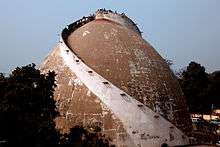Patna
Patna /ˈpætnə, ˈpʌt-/ (![]()
Patna | |
|---|---|
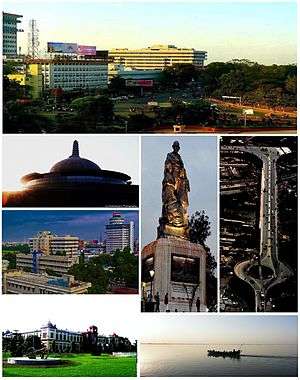 Anticlockwise from top: South-West Gandhi Maidan Marg, Stupa of Buddha Smriti Park, Skyline near Biscomaun Bhawan, Patna Museum, river Ganges, Mithapur Flyover and Statue of Mahatma Gandhi in Gandhi Maidan | |
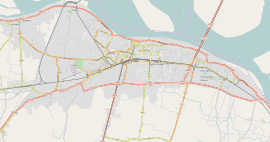 Patna 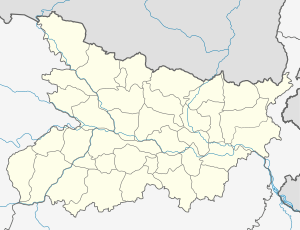 Patna  Patna 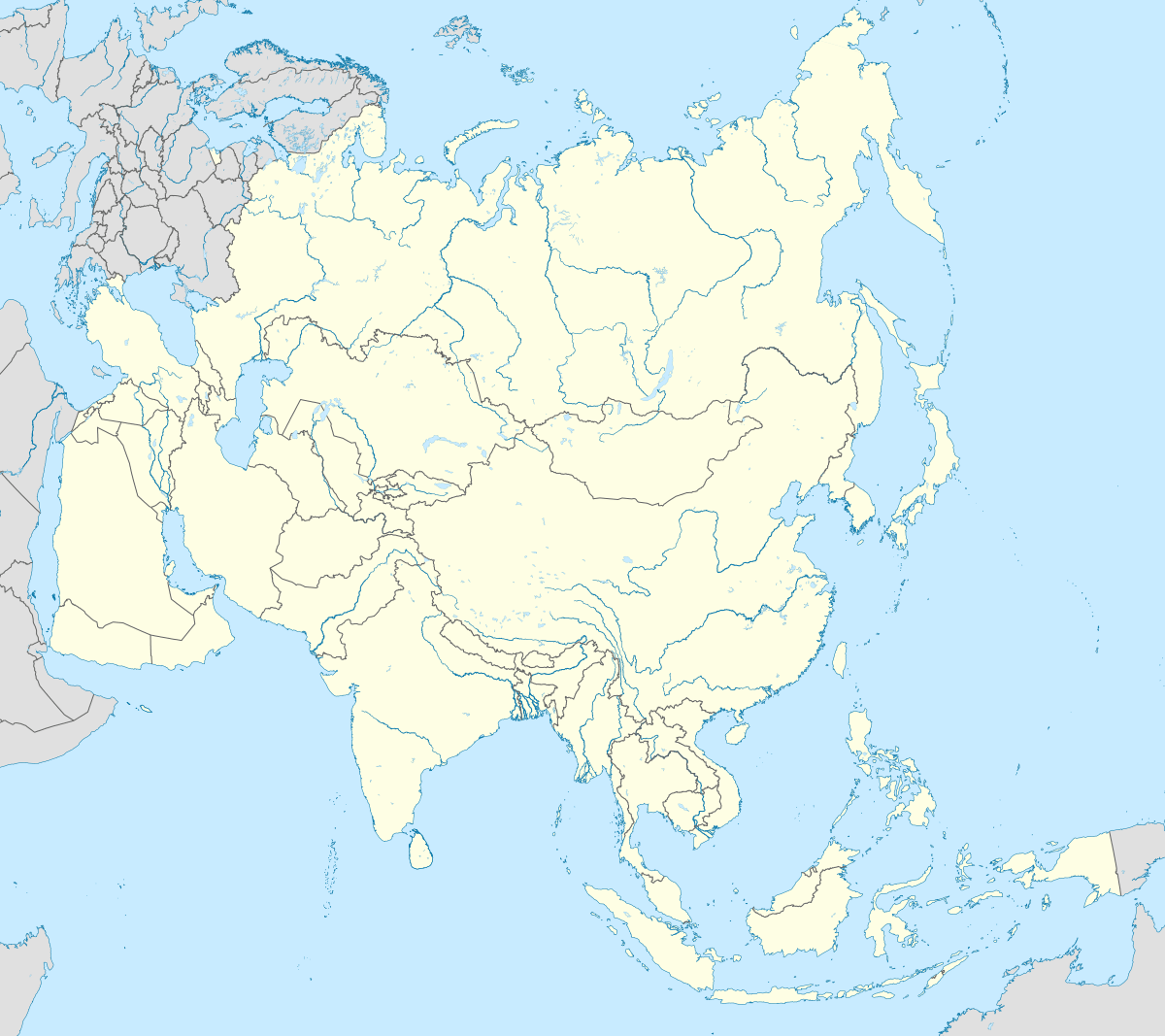 Patna | |
| Coordinates: 25.6°N 85.1°E | |
| Country | India |
| State | Bihar |
| Division | Patna |
| District | Patna |
| Ward | 75 |
| Founded by | Udayin |
| Government | |
| • Type | Mayor–Council |
| • Body | Patna Municipal Corporation |
| • Mayor | Sita Sahu, BJP Supported[1] |
| • Municipal Commissioner | Anupam Kumar Suman, IRS |
| • District Magistrate | Kumar Ravi, IAS |
| Area | |
| • City | 99 km2 (38 sq mi) |
| • Urban | 217 km2 (84 sq mi) |
| • Metro | 1,167 km2 (451 sq mi) |
| Elevation | 53 m (174 ft) |
| Population (2011)[3] | |
| • City | 1,695,000 (IN: 19th) |
| • Urban | 2,046,652 (IN: 18th) |
| • Metro | 3,440,000 |
| Demonym(s) | Patnawaasi, Patnaites |
| Language | |
| • Official | Hindi[4] |
| • Additional official | Urdu[4] |
| • Regional | Magahi, Bhojpuri |
| Time zone | UTC+5:30 (IST) |
| Pincode(s) | 8000xx |
| Area code(s) | +91-612 |
| ISO 3166 code | IN-BR-PA |
| Vehicle registration | BR-01 |
| UN/LOCODE | IN PAT |
| Sex ratio | 980 (females per 1000 males)[3] ♂/♀ |
| Lok Sabha constituencies | Patna Sahib and Pataliputra |
| Vidhan Sabha constituencies | Digha (181), Bankipur (182), Kumhrar (183), Patna Sahib (184), Fatuha (185), Danapur (186), Maner (187), Phulwari-SC (188) |
| Planning agency | Patna Metropolitan Area Authority Bihar Urban Infrastructure Development Corporation |
| Climate | Cwa (Köppen) |
| Precipitation | 1,100 millimetres (43 in) |
| Avg. annual temperature | 26 °C (79 °F) |
| Avg. summer temperature | 30 °C (86 °F) |
| Avg. winter temperature | 17 °C (63 °F) |
| Website | patna patnanagarnigam |
One of the oldest continuously inhabited places in the world,[7] Patna was founded in 490 BCE by the king of Magadha. Ancient Patna, known as Patliputra, was the capital of the Magadh Empire under the Haryanka, Nanda, Mauryan, Shunga, Gupta and Pala empires. Pataliputra was a seat of learning and fine arts. Patliputra was home to many astronomers and scholars including Aryabhata, Vātsyāyana and Chanakya .[8][9] Its population during the Maurya period (around 300 BCE) was about 400,000.[10] Patna served as the seat of power, political and cultural centre of Indian subcontinent during the Maurya and Gupta empires.[11] With the fall of Gupta Empire, Patna lost its glory. It was revived again in the 17th century by the British as a centre of international trade. Following the partition of Bengal presidency in 1912, Patna became the capital of Bihar and Orissa Province.[12]
The modern city of Patna is situated on the southern bank of river Ganges. The city also straddles the rivers Sone, Gandak and Punpun. The city is approximately 35 kilometres (22 mi) in length and 16 to 18 kilometres (9.9 to 11.2 mi) wide. In June 2009, the World Bank ranked Patna second in India (after Delhi) for ease of starting a business.[13] As of 2015, Patna's per capita gross domestic product is ₹1,06,000 ($1581).[14] Using figures for assumed average annual growth, Patna is the 21st fastest growing city in the world and 5th fastest growing city in India according to a study by the City Mayors Foundation. Patna registered an average annual growth of 3.72% during 2006–2010.[15]
The Buddhist, Hindu and Jain pilgrimage centres of Vaishali, Rajgir, Nalanda, Bodh Gaya and Pawapuri are nearby and Patna City is also a sacred city for Sikhs as the tenth Sikh Guru, Guru Gobind Singh was born here.[16]
Etymology
The name of this city has changed with time. One of the oldest cities of India, there are several theories regarding the origin of the modern name Patna (Devanagari:पटना) (Gurmukhi:ਪਟਨਾ) It is etymologically derived from Patan (Devanagari: पटन), the name of the Hindu goddess, Patan Devi.[17]
- Patan Devi Mandir is still situated in old Patna near Gulzarbagh mandi along with another Patan Devi Mandir near Takht Sri Patna Sahib in Patna city.
- Many believe Patna derived its name from Patli, a tree variety that was found in abundance in the historic city.[18] It is also seen on the state tourism's logo.[19]
- The place is mentioned in Chinese traveller Fa Hien's records as Pa-lin-fou.[17]
- The city has been known by various names through more than 2,000 years of existence – Pataligrama, Pataliputra, Kusumapura, Kusumdhwaja Pushpapuram, Padmavathi, Azimabad and the present-day Patna.[20][21]
- Legend ascribes the origin of Patna to the mythological King Putraka who created Patna by magic for his queen Patali, literally "trumpet flower", which gives it its ancient name Pataligrama. It is said that in honour of the queen's first-born, the city was named Pataliputra. Gram is Sanskrit for village and Putra means son.[22] Legend also says that the Emerald Buddha was created in Patna (then Pataliputra) by Nagasena in 43 BCE.[23]
History
Ancient Era
Patna assumed importance and grandeur around 490 BCE[24][25] as Ajatashatru, the king of Magadha, wanted to shift his capital from the hilly Rajagrha (today's Rajgir) to a strategically located place to better combat the Licchavis of Vaishali.[26] He chose the site on the bank of the Ganges and fortified the area. Gautama Buddha travelled through this place in the last year of his life. He prophesied a great future for this place even as he predicted its ruin due to flood, fire and feud.[27]
Mauryan empire
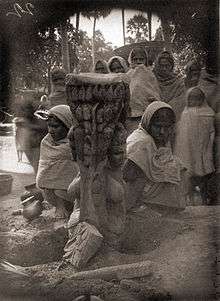
Megasthenes, the Indo-Greek historian and ambassador to the court of Chandragupta Maurya, gave one of the earliest accounts of the city. He wrote that the city was situated on the confluence of the rivers Ganga and Arennovoas (Sonabhadra — Hiranyawah) and was 14 kilometres (9 mi) long and 2.82 kilometres (1.75 mi) wide.[28][29] Megasthenes, the Greek ambassador to India, described the city as the greatest city on earth during its heyday.[30] The Shungas ultimately retained control of Pataliputra and ruled for almost 100 years. The Shungas were then followed by the Kanvas and eventually by the Guptas.[31]
A number of Chinese travellers came to India in pursuit of knowledge and recorded their observations about Pataliputra in their travelogues. One such famous account was recorded by a Chinese Buddhist traveller Fa Hien, who visited India between 399 and 414 CE, and stayed here for many months translating Buddhist texts.[32]
When Chinese Buddhist Monk Faxian visited the city in 400 A.D, he found the people to be rich and prosperous; they practised virtue and justice. He found that the nobles and householders of the city had constructed several hospitals in which the poor of all countries, the destitute, the crippled and the diseased can get treatment. They could receive every kind of help gratuitously. Physicians would inspect the diseases, and order them food, drink, and medicines.[33]
- Pataliputra as a capital of the Magadha Empire.
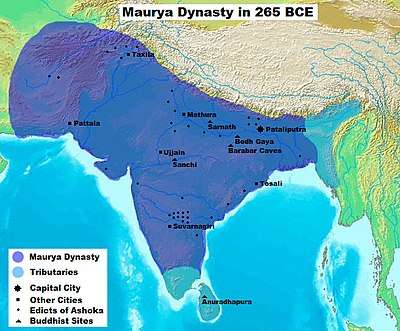 Pataliputra as a capital of Maurya Empire.
Pataliputra as a capital of Maurya Empire.
The Maurya Empire at its largest extent under Ashoka the Great.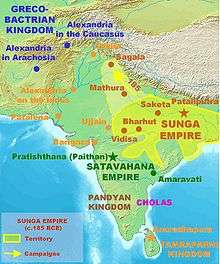 Pataliputra as a capital of Shunga Empire.
Pataliputra as a capital of Shunga Empire.
Approximate greatest extent of the Shunga Empire (c. 185 BCE).
Gupta and Pala empire
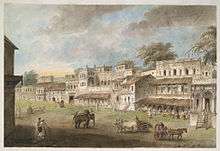

In the years that followed, many dynasties ruled the Indian subcontinent from the city, including the Gupta dynasty and the Pala kings. With the disintegration of the Gupta empire, Patna passed through uncertain times. Bakhtiar Khilji captured Bihar in the 12th century and destroyed everything, and Patna lost its prestige as the political and cultural centre of India.[34]
Guru Gobind Singh (22 December 1666 – 7 October 1708), the tenth Guru of the Sikhs, was born as Gobind Rai in Patna to Guru Teg Bahadur, the ninth Guru of the Sikhs, and his wife Mata Gujri. His birthplace, Patna Sahib is one of the most sacred sites of pilgrimage for Sikhs.[35]
Mughal empire
The Mughal empire was a period of unremarkable provincial administration from Delhi.[36] The most remarkable period during the Middle Ages was under the afghan emperor Sher Shah Suri, who revived Patna in the middle of the 16th century. He built a fort and founded a town on the banks of the Ganges. Sher Shah's fort in Patna does not survive, although the Sher Shah Suri mosque, built in Afghan architectural style, does. Mughal emperor Akbar reached Patna in 1574 to crush the rebellious Afghan Chief Daud Khan. One of the navratnas from Akbar's court, his official historian and author of "Ain-i-Akbari" Abul Fazl refers to Patna as a flourishing centre for paper, stone and glass industries. He also refers to the high quality of numerous strains of rice grown in Patna, famous as Patna rice in Europe.[37]
By 1620, the city of Patna was being described as the "chefest mart towne of all Bengala" (i.e. largest town in Bengal)[26][38] in northern India, "the largest town in Bengal and the most famous for trade".[39] This was before the founding of the city of Calcutta. Mughal Emperor Aurangzeb acceded to the request of his favourite grandson, Prince Muhammad Azim, to rename Patna as Azimabad, in 1704 while Azim was in Patna as the subedar. Patna or Azimabad did see some violent activities, according to Phllip Mason, writing in the book "The Men Who Ruled India". "Aurangzeb had restored the poll-tax (Jazia) on unbelievers and this had to be compounded for. In Patna, Peacock the Chief of the factory, was not sufficiently obliging and was seized, forced to walk through the town bare-headed and bare-footed and subjected to many other indignities before he paid up and was released." However, very little changed during this period other than the name. With the decline of the Mughal empire, Patna moved into the hands of the Nawabs of Bengal, who levied a heavy tax on the populace but allowed it to flourish as a commercial centre. The mansions of the Maharaja of Tekari Raj dominated the Patna river front in 1811–12.[40]
Portuguese Empire
As trade grew, settlements of the Portuguese empire expanded to the Bengal Gulf. Since at least 1515 the Portuguese where at Bengal as traders, and later in 1521 an embassy was sent to Gaur to be able to create factorys in the region. The Bengal Sultan after 1534 allowed the Portuguese to create several settlements as Chitagoong e Satgaon.[41] In 1535 the Portuguese were allied with the Bengal sultan and held the Teliagarhi pass[42] 280 km from Patna helping to avoid the invasion by the Mughals. By then several of the products came from Patna and the Portuguese send in traders, establishing a factory there since 1580 at least.[43] The products where shipped out down the river until other portuguese ports as Chittagoon e Satgaoon, and from there to the rest of the empire.
British empire
During the 17th century, Patna became a centre of international trade.[38] In 1620, the English East India Company established a factory in Patna for trading in calico and silk. Soon it became a trading centre for saltpetre. Francois Bernier, in Travels in the Mogul Empire (1656–1668), says ". It was carried down the Ganges with great facility, and the Dutch and English sent large cargoes to many parts of the Indies, and to Europe". This trade encouraged other Europeans, principally the French, Danes, Dutch and Portuguese, to compete in the lucrative business. Peter Mundy, writing in 1632, described Patna as "the greatest mart of the eastern region".[36] After the decisive Battle of Buxar of 1764, as per the treaty of Allahabad East India Company was given the right to collect tax of this former Mughal province by the Mughal emperor. Patna was annexed by the company in 1793 to its territory when Nizamat(Mughal suzernaity) was abolished and British East India company took control of the province of Bengal-Bihar. Patna however continued as a trading centre.
In 1912, when the Bengal Presidency was partitioned, Patna became the capital of the British province of Bihar and Orissa, although in 1935 Orissa became a separate entity with its own capital. Till date a major population of Bengalis live in Patna particularly.[12][44]
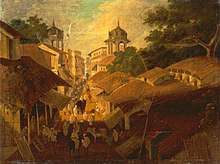 Street in Patna, 1825 (British, active in India)
Street in Patna, 1825 (British, active in India)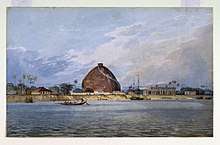
Indian independence movement
People from Patna were greatly involved in the Indian independence movement.[45][46] Most notable movements were the Champaran movement against the Indigo plantation and the 1942 Quit India Movement.[47][48] National leaders who came from the city include Swami Sahajanand Saraswati; the first President of the Constituent Assembly of India, Dr. Rajendra Prasad; Bihar Vibhuti (Anugrah Narayan Sinha); Basawon Singh (Sinha); and Loknayak (Jayaprakash Narayan).
Post-Independence
Patna remained the capital of Bihar after India gained independence in 1947, even as Bihar was partitioned again in 2000 when Jharkhand became a separate state of the Indian union.[44]
On 27 October 2013, six people were killed and 85 others were injured in a series of co-ordinated bombings at an election rally for BJP candidate Narendra Modi.[49] On 3 October 2014, 33 people were killed and 26 injured in a stampede at Gandhi Maidan during Vijaya Dashmi celebrations.[50]
Geography
Topography
| Jurisdiction | Population | |||||
|---|---|---|---|---|---|---|
| Town | Type | Estimate (2011) | ||||
| Patna' | Municipal Corporation | 1,684,222 | ||||
| Danapur | Nagar Parishad | 182,429 | ||||
| Badalpura | Out Growth | 75 | ||||
| Danapur Cantonment | Cantonment Board | 28,723 | ||||
| Khagaul | Nagar Parishad | 44,364 | ||||
| Nohsa | Census Town | 16,680 | ||||
| Pataliputra Housing Colony | Census Town | 3,531 | ||||
| Phulwari Sharif | Nagar Parishad | 81,740 | ||||
| Saidpura | Census Town | 7,392 | ||||
| Patna UA | 2,049,156 | |||||
| Patna district | 5,838,465 | |||||
| Source:[51][52] | ||||||
Patna is located on the southern bank of the river Ganges[53] in Eastern India. The total area of Patna is 136 km2 (53 sq mi). Of this, the municipal area constitutes 99 km2 (38 sq mi), while the suburban area constitutes 36 km2 (14 sq mi). The exact cartographic co-ordinates of Patna are 25.6°N 85.1°E. It has an average elevation of 53 m (174 ft). A characteristic feature of the geography of Patna is at the confluence of rivers.[54]
During the British Raj, Patna was part of the Bengal Presidency. After Nalanda district was carved out of Patna district in 1976,[55] Patna was purged of all hilly regions. It is an alluvial, flat expanse of land .The land in the district is too fertile and is almost entirely cultivated with no forest cover . Alluvial soil found herevis ideal for cultivation of rice, sugarcane and other foodgrains. The area under cultivation is studded with mango orchards and bamboo groves . In the fields along the banks of river Ganges, weeds such as ammannia, citriculari, hygrophile and sesbania grow. But palmyra, date palm and mango orchards are found near habitations. Dry stretches of shrubbery are sometimes seen in the villages far from the rivers. Trees commonly found are bel, siris, jack fruit and the red cotton tree.[56] Patna is unique in having four large rivers in its vicinity.[57] It is the largest riverine city in the world.[58] The topography of Patna city is saucer shaped as per Patna City Development Plan prepared in 2006 .[59][60] The bridge over the river Ganges named Mahatma Gandhi Setu is 5575m long and is the longest river bridge in the India.[61]
Patna comes under India's seismic zone-IV, indicating its vulnerability to major earthquakes, but earthquakes have not been common in recent history.[62] Patna also falls in the risk zone for floods and cyclones.[63][64]
Climate
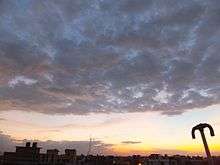
Patna has a Humid subtropical climate under the Köppen climate classification: (Cwa) with extremely hot summers from late March to early June, the monsoon season from late June to late September and chilly winter nights and foggy or sunny days from November to February[65] Highest temperature ever recorded was 46.6 °C (115.9 °F), in the year 1966,[66] the lowest ever was 1.1 °C (34 °F), on 9 January 2013,[67] and highest rainfall was 204.5 mm (8.05 in), in the year 1997.[66]
The table below details historical monthly averages for climate variables.
Climate data for Patna Airport (1981–2010, extremes 1951–2012) | |||||||||||||
|---|---|---|---|---|---|---|---|---|---|---|---|---|---|
| Month | Jan | Feb | Mar | Apr | May | Jun | Jul | Aug | Sep | Oct | Nov | Dec | Year |
| Record high °C (°F) | 30.0 (86.0) |
35.1 (95.2) |
41.4 (106.5) |
44.6 (112.3) |
45.6 (114.1) |
46.6 (115.9) |
41.2 (106.2) |
39.7 (103.5) |
37.5 (99.5) |
37.2 (99.0) |
34.1 (93.4) |
30.5 (86.9) |
46.6 (115.9) |
| Average high °C (°F) | 22.4 (72.3) |
26.0 (78.8) |
32.2 (90.0) |
37.0 (98.6) |
37.4 (99.3) |
36.4 (97.5) |
33.0 (91.4) |
32.9 (91.2) |
32.5 (90.5) |
31.9 (89.4) |
29.0 (84.2) |
24.5 (76.1) |
31.3 (88.3) |
| Average low °C (°F) | 9.3 (48.7) |
12.1 (53.8) |
16.7 (62.1) |
22.1 (71.8) |
25.1 (77.2) |
26.7 (80.1) |
26.3 (79.3) |
26.3 (79.3) |
25.5 (77.9) |
21.5 (70.7) |
15.1 (59.2) |
10.5 (50.9) |
19.8 (67.6) |
| Record low °C (°F) | 1.4 (34.5) |
3.4 (38.1) |
8.2 (46.8) |
13.3 (55.9) |
17.7 (63.9) |
19.3 (66.7) |
21.1 (70.0) |
20.5 (68.9) |
19.0 (66.2) |
12.0 (53.6) |
7.7 (45.9) |
2.2 (36.0) |
1.4 (34.5) |
| Average rainfall mm (inches) | 11.1 (0.44) |
14.0 (0.55) |
9.5 (0.37) |
12.7 (0.50) |
43.7 (1.72) |
162.5 (6.40) |
354.4 (13.95) |
277.8 (10.94) |
197.7 (7.78) |
49.1 (1.93) |
7.2 (0.28) |
6.1 (0.24) |
1,145.8 (45.11) |
| Average rainy days | 1.2 | 1.3 | 0.7 | 1.0 | 2.9 | 6.9 | 14.3 | 12.5 | 9.5 | 2.9 | 0.5 | 0.6 | 54.2 |
| Average relative humidity (%) (at 17:30 IST) | 65 | 52 | 37 | 32 | 42 | 59 | 75 | 75 | 76 | 68 | 67 | 69 | 60 |
| Mean monthly sunshine hours | 207.7 | 228.8 | 260.4 | 264.0 | 272.8 | 192.0 | 130.2 | 151.9 | 162.0 | 238.7 | 240.0 | 201.5 | 2,550 |
| Mean daily sunshine hours | 6.7 | 8.1 | 8.4 | 8.8 | 8.8 | 6.4 | 4.2 | 4.9 | 5.4 | 7.7 | 8.0 | 6.5 | 7.0 |
| Source: India Meteorological Department (sun 1971–2000)[68][69][70] | |||||||||||||
Air pollution
Pollution is a major concern in Patna. According to the CAG report, tabled in the Bihar Legislative Assembly in April 2015, respirable suspended particulate matter (RSPM) level (PM-10) in Patna was 355, three-and-a-half times higher than the prescribed limit of 100 micro-gram per cubic metre,[71] primarily due to high vehicular[72] and industrial emissions[73] and construction activities in the city.[74] In May 2014, a World Health Organization survey declared Patna the second most air polluted city in India, only after Delhi, with the survey calculating the airborne particulate matter in the state capital's ambient air (PM-2.5) to be 149 micro-grams, six times more than the safe limit, which is 25 micro-grams.[75] Severe air pollution in the city has caused a rise in pollution-related respiratory ailments, such as lung cancer, asthma, dysentery and diarrhoea.[76][77] The dense smog in Patna during winter season results in major air and rail traffic disruptions every year.[78]
Economy
Patna has long been a major agricultural hub and centre of trade . Its most active exports are grain, sugarcane, sesame, and medium-grained Patna rice. There are several sugar mills in and around Patna.[79] It is an important business and luxury brand centre of eastern India.[80]
The economy of Patna has seen sustained economic growth since 2005. The economy has been spurred by growth in the Fast-Moving Consumer Goods industry, the service sector, along with Green revolution businesses.[80] In 2009, the World Bank stated Patna as the second best city in India to start up a business.[81] As of 2015, GDP per capita of Patna is ₹1,06,000 ($1581) and its GDP growth rate is 7.29 per cent.[82]
Patna is the 21st fastest growing city in the world and the fifth fastest growing city in India, and is expected to grow at an average annual rate of 3.72%.[15]
Patna is also emerging as a IT based economy. Tata Consultancy Services-Patna got operational in 2019 at its new office.[83]
- State Bank of India- Patna Regional office at East Gandhi Maidan Marg
- Reserve Bank of India's regional office at South Gandhi Maidan Marg, Patna
Demographics
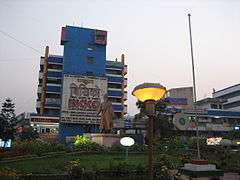
| Historical population | ||
|---|---|---|
| Year | Pop. | ±% |
| 1807–14 | 312,000 | — |
| 1820 | 100,000 | −67.9% |
| 1865 | 284,100 | +184.1% |
| 1872 | 158,000 | −44.4% |
| 1881 | 170,684 | +8.0% |
| 1891 | 165,200 | −3.2% |
| 1901 | 134,785 | −18.4% |
| 1911 | 136,153 | +1.0% |
| 1921 | 119,976 | −11.9% |
| 1931 | 159,690 | +33.1% |
| 1941 | 196,415 | +23.0% |
| 1951 | 283,479 | +44.3% |
| 1961 | 364,594 | +28.6% |
| 1971 | 475,300 | +30.4% |
| 1981 | 813,963 | +71.3% |
| 1991 | 1,099,647 | +35.1% |
| 2001 | 1,376,950 | +25.2% |
| 2011 | 1,683,200 | +22.2% |
| Note: Huge population decline after 1814 due to the decrease in the river borne trade, persistent unhealthiness and repeated epidemics of plaque. Source: [84][85][86] | ||
With an estimated population of 1.68 million in 2011, Patna is the 19th most populous city in India and with over 2 million people, its urban agglomeration is the 18th largest in India. Residents of Patna are referred to by the demonym Patnaite.[87][88]
According to 2011 census data, Patna city had a population of 1,683,200 (before expansion of the city limits) within the corporation limits, with 894,158 men and 789,042 women. This was an increase of 22.2 percent compared to the 2001 figures. 11.32 per cent of the population was under six years of age, with 102,208 boys while 88,288 are girls. The overall literacy rate is 83.37%, with the male literacy rate being 87.35% and the female literacy rate being 79.89%. The sex ratio of Patna is 885 females per 1,000 males. Child sex ratio of girls is 877 per 1000 boys.[89] The urban agglomeration had a population of 2,046,652 of which 1,087,864 are males and 958,788 are females with 82.73% literacy.[90] Patna metropolitan region constitutes the second largest metropolitan region in eastern India.
According to the 2011 census of India, Patna's major religion is Hinduism with 86.39% followers. Islam is second most popular religion in Patna with approximately 12.27% following it. Christianity, Jainism, Sikhism and Buddhism, with smaller followings, are also practised in Patna. During last census report, around 0.01% stated other religion and approximately 0.49% stated no particular religion.[89]
Roughly 0.25% of Patna's population lives in slums which makes Patna, the city with the lowest percentage of people living in slum in India.[91] Like other fast-growing cities in the developing world, Patna suffers from major urbanisation problems including unemployment, poor public health and poor civic and educational standards for a large section of the population.[92] In 2015, the National Sample Survey Organisation revealed that, for females, Patna had highest unemployment rate 34.6% and for males it was the second highest with a rate of 8% in 2011–12.[93]
Hindi is the official language of the state of Bihar but many other languages are spoken too. The native dialect is Magadhi or Magahi, named after Magadha, the ancient name of South Bihar is most widely spoken. English is widely spoken by Patnaites, and other widely spoken dialects and languages include Bhojpuri, Maithili, Bengali, Urdu and Oriya.[94]
Government and public services
Civic administration
The civic administration of Patna is run by several government agencies, and has overlapping structural divisions. At least five administrative definitions of the city are available; listed in ascending order of area, those are:
- Patna division
- Patna district (also the Patna Police area),
- the Patna Metropolitan Region[95] (also known as Patna Planning area)[96]
- "Greater Patna" or PRDA area, which adds to the PMC area a few areas just adjacent to it[97]
- Patna Municipal Corporation area.
The Patna Municipal Corporation, or PMC, oversees and manages the civic infrastructure of the city's 75 wards,[98] which accommodates a population of 1.7 million as per 2011 Census. The municipal corporation consists of democratically elected members, each ward elects a Councillor to the PMC.[99] The PMC is in charge of the civic and infrastructure needs of the metropolis. As Patna's apex body, the corporation discharges its functions through the mayor-in-council, which comprises a mayor, a deputy mayor, and other elected members of the PMC. The Mayor is usually chosen through indirect election by the councillors from among themselves. The functions of the PMC include water supply, drainage and sewerage, sanitation, solid waste management, street lighting, and building regulation. The Municipal Commissioner is the chief Executive Officer and head of the executive arm of the Municipal Corporation. All executive powers are vested in the Municipal Commissioner who is an Indian Administrative Service (IAS) officer appointed by the state government.[100] Although the Municipal Corporation is the legislative body that lays down policies for the governance of the city, it is the Commissioner who is responsible for the execution of the policies. The Commissioner is appointed for a fixed term as defined by state statute. The powers of the Commissioner are those provided by statute and those delegated by the Corporation or the Standing Committee. As of June 2017, the BJP won PMC Mayor seat; the mayor is Sita Sahu, while the deputy mayor is Vinay Kumar Pappu.[98]
| City officials | ||||
|---|---|---|---|---|
| Assumed office | Office | Source | ||
| Corporation Mayor | Sita Sahu, BJP | June 2017 | Maurya Lok | [98] |
| Corporation Commissioner | Anupam Kumar Suman IRS | June 2018 | Maurya Lok | [101] |
| Divisional Commissioner | Anand Kishor IAS | Aug 2015 | Near Golghar, Gandhi Maidan | [102] |
| District Magistrate | Kumar Ravi IAS | January 2018 | Patna Collectorate | [103] |
| Senior Superintendent of Police | Garima Mallik, IPS | Jan 2019 | South Gandhi Maidan Marg | [104] |
The Patna Municipal Corporation was ranked 4th out of 21 Cities for best governance & administrative practices in India in 2014. It scored 3.6 on 10 compared to the national average of 3.3.[105]
The revenue district of Patna come under the jurisdiction of a District Collector (District Magistrate).[106] The Collectors are in charge of the general administration, property records and revenue collection for the Central Government, and oversee the national elections held in the city.[107]
The Bihar Urban Infrastructure Development Corporation Limited (BUIDCO) and the Patna Metropolitan Area Authority, are responsible for the statutory planning and development of Patna Metropolitan Region.[108] Patna Metropolitan Area Authority was established in 2016.[109] It is the superseding agency for the former Patna Regional Development Authority (PRDA), which was dissolved in 2006.[110]
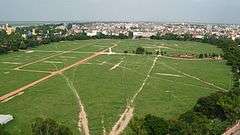
In addition to city government, numerous commissions and state authorities—including the Ministry of Tourism, the Bihar Health Department, the Bihar Water Resources Department, National Ganga River Basin Authority, Bihar State Pollution Control Board and the Bihar Public Service Commission—play a role in the life of Patnaites. As the capital of Bihar, Patna plays a major role not only in state politics[111] but in central politics as well.[112]
As the seat of the Government of Bihar, The city has several federal facilities, including the Raj Bhavan: Governor's house, the Bihar Legislative Assembly; the state secretariat, which is housed in the Patna Secretariat; and the Patna High Court. The Patna High Court is one of the oldest High Court in India. The Patna High Court has jurisdiction over the state of Bihar.[113] Patna also has lower courts; the Small Causes Court for civil matters, and the Sessions Court for criminal cases.[114][115] The Patna Police, commanded by Senior Superintendent of Police, is overseen by the Bihar Government's Home Department. The Patna district elects two representatives to India's lower house, the Lok Sabha,[116] and 14 representatives to the state legislative assembly.
| City representatives (Legislators) | ||||
|---|---|---|---|---|
| Member | Party | Constituency | Source | |
| Ravi Shankar Prasad, MP | BJP | Patna Sahib | [117] | |
| Ram Kripal Yadav, MP | BJP | Pataliputra | [117] | |
| Sanjiv Chaurasia, MLA | BJP | Digha | [118] | |
| Nitin Naveen, MLA | BJP | Bankipur | [118] | |
| Nand Kishore Yadav, MLA | BJP | Patna Sahib | [118] | |
| Arun Kumar Sinha, MLA | BJP | Kumhrar | [118] | |
| Jai Vardhan Yadav, MLA | RJD | Paliganj | [118] | |
| Rama Nand Yadav, MLA | RJD | Fatuha | [119] | |
| Asha Devi, MLA | BJP | Danapur | [118] | |
| Bhai Virendra, MLA | RJD | Maner | [120] | |
| Shyam Rajak, MLA | JDU | Phulwari | [120] | |
Patna master plan
In October 2016, Bihar cabinet approved the Patna master plan 2031 which envisages development of a new airport at Bihta.[121][122] Patna master 2031 is the second master plan of city which has been passed ever, after the last plan was approved for 1961-1981.[123] Patna master plan covers six urban local bodies - Patna Municipal Corporation, Danapur Nagar Parishad, Phulwarisharif Nagar Parishad, Khagaul Nagar Parishad, Maner Nagar Panchayat and Fatuha Nagar Parishad.[124] 5 satellite towns have also been proposed in the master plan at Bihta, Naubatpur, Punpun, Fatuha and Khusrupur.
Smart city
Patna has been selected as one of the hundred Indian cities to be developed as a smart city under Government of India's flagship Smart Cities Mission.[125] With the grade of a Smart city, Patna will have highly up-to-date and radical provisions like uninterrupted electric supply, first-rate traffic and transport system, superior health care and many other prime utilities. Under this scheme, the city will use digital technology that will act as the integral mechanism of the aforesaid facilities and thereby further elevate the lifestyle of the citizens. A special purpose vehicle company named the Patna Smart City Limited has been formed to implement the smart city projects. On 22 November 2017, Eptisa Servicios de Ingenieria SL of Spain was chosen as the project management consultant.[126]
Utility services
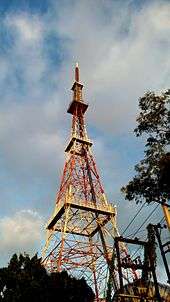
Ground water fulfills the basic need of the people,[127] administered by Patna Jal Parishad under Patna Municipal Corporation.[128] The public water supply system comprises 98 tube wells[129] that pump water directly to the distribution mains. Around 23 overhead reservoirs[127] of which only the one's at Agam Kuan, Gulzarbagh Press, Guru Gobind Singh Hospital and High Court serves the city. The sewerage system in Patna was set up in 1936. At present there are four sewage treatment plants[130] located at Saidpur, Beur, Pahari and Karmali Chak.[131] In 2019, the central government has started the process Nirmal Ganga, which is to build new sewerage infrastructure at Patna’s Karmalichak as well as in Barh, Naugachia and Sultanganj. The new infrastructure will be capable of preventing the flow of 6.7 crore litre of sewage into Ganga.[132]
As of 2011, the city's electricity consumption is about 601 kWh per capita, even though the actual demand is much higher.[133] Electricity supply to the city is regulated and distributed by the South Bihar Power Distribution Company Limited[134] managed by Bihar State Power Holding Company Limited (the holding company and a successor company of erstwhile Bihar State Electricity Board).[135] The city forms the Patna Electricity Supply Unit (PESU)[136] Circle, which is further divided into two wings namely Patna East (consists Kankarbagh, Patna City, Gulzarbagh, Bankipore, Rajendra Nagar Divisions) and Patna West (Consists Danapur, New Capital, Pataliputra, Gardanibagh, Dak Bungalow divisions).[137][138]
Direct–to–home (DTH) is available via DD Free Dish, Airtel digital TV, Dish TV, Tata Sky, Videocon d2h, Sun Direct and Reliance Digital TV.[139] Cable companies include Darsh Digital Network Pvt. Ltd.,[140] SITI Maurya Cablenet Pvt. Ltd[141] etc. The Conditional Access System for cable television was implemented in March 2013.[142]
Patna comes under the Patna Telecom District of the Bharat Sanchar Nigam Limited (BSNL),[143] India's state-owned telecom and internet services provider. Both Global System for Mobile Communications (GSM) and Code division multiple access (CDMA) mobile services are available.[144] Apart from telecom, BSNL also provides broadband internet service.[145] Among private enterprises, Bharti Airtel, Reliance Jio, Reliance GSM/CDMA, Idea Cellular, Aircel, Tata Teleservices (Tata DoCoMo, Virgin Mobile and Tata Indicom), Telenor (Formerly Uninor & Now Acquired by Bharti Airtel), Vodafone and Videocon Telecom[146] are the leading telephone and cell phone service providers in the city.[147][148]
Patna was the second Indian city, after Bangalore,[149] which offered free WiFi connectivity to its citizens in February 2014. By surpassing the previous record-holder, Beijing in China,[150] Patna's WiFi zone is the world's longest free WiFi zone, which covers a 20-km stretch from NIT Patna on Ashok Rajpath to Danapur.[151][152]
Transport and connectivity
Patna is located about 100 km south of national East – West Highway corridor. The NH 30, NH 31 and NH 2 passes through the city. The Ashok Rajpath, Patna-Danapur Road, Bailey Road, Harding Road and Kankarbagh old bypass Road are the major corridors.
Patna was one of the first places in India to use horse-drawn trams for public transport.[153] Public transportation today is provided for by buses, auto rickshaws and local trains. Auto rickshaws are said to be the lifeline of the city.[154] BSRTC has started City bus service on all major routes of Patna.[155][156] App based cab service is available within city.[157][158]


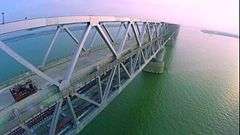
Air
Patna Airport known as Lok Nayak Jayaprakash Narayan International Airport is classified as a restricted international airport.[159] The arrival of several low-cost carriers and a number of new destinations have caused a growth in air traffic in recent years, as has an improvement in the situation with regard to law and order.[160] For the period April to December 2009 the airport ranked first in a survey of 46 airports in the country in terms of percentage growth of domestic passengers as well as domestic aircraft movement.[161] The Airport Authority of India (AAI) has proposed to develop a civil enclave at Bihta Air Force Station to serve as the new airport for Patna. The military airfield lies 40 kilometres (25 mi) southwest of Patna, in Bihta.[162]
Rail
Patna is served by several railway stations located in different areas of the city. The Patna Junction railway station is the main railway station of the city, and one of the busiest railway stations in India.[163] Patna lies in between New Delhi and Kolkata on Howrah–Delhi main line, which is one of the busiest rail routes in India.[164] Patna Junction is directly connected to most of the major cities in India.[165] The city has four additional major railway stations: Rajendra Nagar Terminal (adjacent to Kankarbagh), Patliputra Junction (near Bailey road), Danapur (near western outskirts) and Patna Sahib (in Patna City area). Danapur is the divisional headquarters of East Central Railway zone's Danapur railway division. Patna is well connected with neighbouring Gaya, Jehanabad, Bihar Sharif, Rajgir, Islampur through daily passenger and express train services. And also connected with Jamalpur Junction and Munger. India's longest road-cum-rail bridge, Digha–Sonpur bridge has been constructed across river Ganges, connecting Digha, Patna to Pahleja Ghat in Sonpur.[166] The bridge was completed in 2015,[167][168] It is 4.55 kilometres (2.83 mi) long and therefore the second longest rail-cum-road bridge in India, after Bogibeel Bridge in Assam.[169]
Road
The city is served by several major road highways and state highways, including National Highways 19,[170] 30,[171] 31,[172] and 83.[173] Asia's longest river bridge, the Mahatma Gandhi Setu (built 1982), is located in Patna and connects the city to Hajipur across the Ganga. In recent times, the bridge has been witnessing major traffic chaos and accidents due to exceeding number of vehicles passing over it and regularly overloading the structure.[174] A new six lane road bridge across the Ganges parallel to Mahatma Gandhi Setu is proposed which would connect Kacchi Dargah in Patna City to Bidupur in Vaishali district,[175] which will be the longest bridge in India after completion.[176] Patna is well connected with roads to various major cities of Bihar like Munger, Jamalpur, Bhagalpur, Gaya, and Purnia.
Patna is 1,015 kilometres (631 mi) East from Delhi, 1,802 kilometres (1,120 mi) North East from Mumbai,1,527 kilometres (949 mi) North from Hyderabad and 556 kilometres (345 mi) North West from Kolkata.[177] Luxury bus service between Patna and several neighbouring cities is provided by the Bihar State Tourism Development Corporation and the Bihar State Road Transport Corporation.[178] Auto Rikshaws are a popular mode of transportation.[179] Prepaid auto services operated by an all-women crew was started in 2013 in Patna,[180] which is the first of its kind in India.[181] Radio Taxi services are also available within city limit as well as outskirts. There are also private options such as Ola Cabs.[158][157]
Rapid transit
Patna Metro is a planned rapid transit system for the city. It would be owned and operated by state run Patna Metro Rail Corporation.[182] It will be constructed on Public Private Partnership (PPP) mode, estimated to cost ₹14,000 crore (US$2 billion).[183] It will have 5 lines with a total planned length of 60 kilometres (37 mi) km, which will be built in 3 phases.[184] Patna Monorail Project covering the municipal area is also underway. Recently the central government approved Patna metro rail project comprising two corridors(Danapur-Mithapur and Patna railway station-New ISBT). According to government, the project will be completed in 5 years with an estimated cost of Rs.13,365.77 crore.[185]
Inland waterways
The Ganges – navigable throughout the year – was the principal river highway across the vast Indo-Gangetic Plain. Vessels capable of accommodating five hundred merchants were known to ply this river in the ancient period; it served as a major trade route, as goods were transported from Pataliputra to the Bay of Bengal and further, to ports in Sri Lanka and Southeast Asia. The role of the Ganges as a channel for trade was enhanced by its natural links – it embraces all the major rivers and streams in both north and south Bihar.[186]
In recent times, Inland Waterways Authority of India has declared the stretch of river Ganges between Allahabad and Haldia National Inland Waterway and has taken steps to restore and maintain its navigability. The National Waterway-1, the longest Waterway in India, stretches 1620 km in the River Ganga from Allahabad to Haldia via Varanasi, Munger, Bhagalpur passes through Patna.[187] This National Waterways has fixed terminal at Patna.[188] In September 2014, a luxury cruise called ‘MV Rajmahal’ from Patna to Varanasi was launched by the state-based Assam Bengal Navigation Company (ABN).[189]
Culture
Patna's native language is Magahi or Magadhi a language derived from the ancient Magadhi Prakrit,[190] which was created in the ancient kingdom of Magadha, the core of which was the area of Patna south of the Ganges. It is believed to be the language spoken by Gautama Buddha. Patna has a vibrant Bengali culture too with many Bengali stalwarts including the first Chief Minister of post independence West Bengal, Bidhan Chandra Ray, being born here.The numerous Bengali speaking Patnaites have contributed massively into fine arts, culture, education and history of Bihar in general and Patna in particular.[191] However, Magahi was the official language of the Mauryan court, in which the edicts of Ashoka were composed.[192]
The name Magahi is directly derived from the name Magadhi Prakrit, and educated speakers of Magahi prefer to call it "Magadhi" rather than "Magahi".[193]
Patna has many buildings adorned with Indo-Islamic[194] and Indo-Saracenic architectural motifs. Several well-maintained major buildings from the colonial period have been declared "heritage structures";[195][196] others are in various stages of decay.[197] Established in 1917 as the Bihar's first museum, the Patna Museum (पटना संग्रहालय) houses large collections that showcase Indian natural history and Indian art.[198] The Khuda Bakhsh Oriental Library and Sinha Library are historic public libraries of Patna.[199][200]

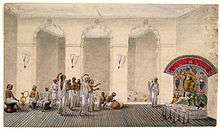
Several theatres are located in or near the central part of the city, including the Bhartiya Nritya Kala Mandir, the Rabindra Parishad, Premchand Rangshala and the Kalidas Rangalaya, which is home to the Bihar art theatre. Kalidas Rangalaya also hosts the Patliputra Natya Mahotsav, a dance festival.[201] But in the last two decades, the popularity of commercial theatres in the city has declined.[202]
The Patna School of Painting or Patna Qalaam, some times also called Company style, is an offshoot of the well-known Mughal Miniature school of painting, which flourished in Bihar during the early 18th to the mid-20th centuries.[203] The practitioners of this art form were descendants of Hindu artisans of Mughal painting who facing persecution under the Mughal Emperor Aurangzeb and who found refuge, via Murshidabad, in Patna during the late 18th century. The Patna painters differed from the Mughal painters, whose subjects included only royalty and court scenes, in that they included as subjects bazaar scenes, scenes of Indian daily life, local dignitaries, festivals and ceremonies, and nature scenes.[204] The paintings were executed in watercolours on paper and on mica, but the style was generally of a hybrid and undistinguished quality. It is this school of painting that inspired the formation of the College of Arts and Crafts, Patna, under the leadership of Shri Radha Mohan, which is an important centre of fine arts in Bihar.[204]
Some well known dishes of Bihari cuisine include sattu paratha (parathas stuffed with roasted gram flour), "sattu ka sharbat"(a spiced drink with roasted gram flour as main ingredient), chokha (spicy mashed potatoes), fish curry, Bihari kebab, postaa-dana kaa halwaa, malpua, dal pitha (Bihari version of momos), kheer makhana (fox nut) and thekua/khajuria (a type of snack).[205]
Street foods such as Samosa,[206] Chaat, litti chokha, phuchka (a deep-fried crêpe with tamarind sauce), South Indian and Chinese cuisine are favourite among Patnaites.[207]
Bihari Women have traditionally worn cotton sari but shalwar kameez and other western attire are gaining acceptance among younger women.[208] Western attire has gained wide acceptance among the urban men, although the traditional dhoti and kurta[209] are seen during festivals. Chhath, also called Dala Chhath, is a major ancient festival in Bihar.[210] It is celebrated twice a year: once in the summer, called the Chaiti Chhath, and once about a week after Deepawali, called the Kartik Chhath. Durga Puja, held in September–October, is Patna's another important festival; it is an occasion for glamorous celebrations.[211][212] Among the city's other festivals, are Saraswati Puja, Eid, Holi, Christmas, Vishwakarma Puja, Makar Sankranti, Raksha Bandhan and Rath Yatra. Cultural events include the Patna Book Fair, Patna Sahib Mahotsav, the Patna Film Festival, Bihar Diwas, Rajgir Mahotsav, Vaishali Mahotsav and the Sonepur Cattle Fair in neighbouring towns.
 People Celebrating Chhath Festival the 2nd Day at Morning a tribute to the rising holy God Sun
People Celebrating Chhath Festival the 2nd Day at Morning a tribute to the rising holy God Sun
Tourism
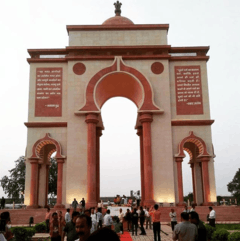
Patna is home to many tourist attractions and it saw about 2.4 million tourists (including day visitors) in 2005. Tourists visiting the city accounted for 41% of the total number of tourists visiting Bihar although Bodh Gaya was the most popular destination for foreign visitors.[213]
The cultural heritage of Bihar is reflected in its many ancient monuments. Kumhrar and Agam Kuan are the sites of the ruins of the Ashokan Pataliputra. Didarganj Yakshi remains as an example of Mauryan art.[214]
Takht Sri Patna Sahib is one of the Five Takhts of Sikhism and consecrates the birthplace of the tenth Guru of the Sikhs, Gobind Singh.[215] There are five other Gurdwaras in Patna which are related to different Sikh Gurus; these are Gurdwara Pahila Bara,[216] Gurdwara Gobind Ghat,[217] Gurdwara Guru ka Bagh,[218] Gurdwara Bal Leela,[219] Gurdwara Handi Sahib.[220] and Prakash Punj.[221]
Padri Ki Haveli, High Court, Golghar, Sultan Palace and Secretariat Building are examples of British architecture. Gandhi Maidan is a historic ground in Patna where several freedom movement rallies took place. Nealy built Buddha Smriti Park near Patna Junction is also becoming a major tourist attraction.
The Patna Planetarium (Indira Gandhi Planetarium) is located in Patna's Indira Gandhi Science Complex. It claims to be one of the largest planetariums in Asia and to attract a large number of tourists.[222]
The Sanjay Gandhi Jaivik Udyan (Patna Zoo) is located at Bailey road, Raj Bhawan, Rajbanshi nagar, and includes over 300 mammals, 300 birds and 450 species of reptiles as of January 2019.[223]
In 2015, the Bihar government has built a state-of-the-art art landmark museum in Patna at a cost of approximately ₹530 crores[224] on a site of 13.9 acres at Bailey Road.[225] 5 firms were shortlisted for the architectural design,[226] of which the Japanese firm Maki and Associates was chosen. It is now completed and opened for all.[227]
Completed in May 2018, the Sabhyata Dwar was built with a Mauryan-style architecture. It was opened to the general public in December 2018.[228]
In 2014, the Bihar government laid foundation of Samrat Ashok International Convention Centre. It is expected to use more steel than used in raising Eiffel Tower and Indira Gandhi International Airport.
Construction of Dr. A.P.J Abdul Kalam Science City began in February 2019.[229]
The Eco Park is located in Jawaharlal Nehru Marg. It has more than 3,000 varieties of plants and includes several theme parks, a restaurant and an area for boat riding.
Education
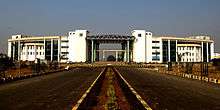
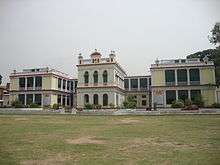
Schools in Patna are either government run schools or private schools . The schools are affiliated to Bihar School Examination Board (BSEB), the All-India Indian Certificate of Secondary Education (ICSE), National Institute of Open Schooling (NIOS) or the Central Board of Secondary Education (CBSE) boards. A number of Bengali medium schools also thrive in Patna.[230] Hindi and English are the primary languages of instruction.[231] A 2012 survey found 1,574 schools: of these, 78% were private unaided schools (most of them at affordable cost), 21% government schools and 1% private aided.[232]
Under the 10+2+3/4 plan, students complete ten years of schooling and then enroll in schools that have a higher secondary facility and are affiliated to the Bihar State Intermediate Board, the All-India Council for the Indian School Certificate Examinations (CISCE), the NIOS[233] or the CBSE, where they select one of three streams: arts, commerce, or science.[230] This is followed by either a general degree course in a chosen field of study, or a professional degree course, such as law, engineering and medicine.[234]
Patna has important government educational institutions like Patna University, Anugrah Narayan College, Chanakya National Law University, Aryabhatta Knowledge University, Indian Institute of Technology Patna, Bakhtiyarpur College of Engineering, National Institute of Technology, Patna, Patna Science College, Patna Women's College, Patna Law College, Bihar Veterinary College, J.D. Women's College, Birla Institute of Technology, Patna,[235] Patna Medical College Hospital, Rajendra Memorial Research Institute of Medical Sciences, Nalanda Medical College Hospital, Indira Gandhi Institute of Medical Sciences, Mahavir Cancer Sansthan, All India Institute of Medical Sciences Patna, National Institute of Fashion Technology Patna, Chandragupta Institute of Management, Development Management Institute, National Institute of Electronics & Information Technology, Patliputra University.[236]
Patna University was established in 1917 and is the seventh oldest modern university in the Indian Sub-continent.[237] Patna also has a variety of other universities, as well as many primary and secondary schools.
Nalanda University (also known as Nalanda International University) is a newly established university located in Rajgir, around 100 kilometres (62 mi) from Patna. The University, created as a revival of an ancient centre of learning at Nalanda, began its first academic session on 1 September 2014.[238] It will attract students from across the globe.[239]
Sports
As in the rest of India, cricket is popular in Patna and is played on grounds and in streets throughout the city.[240] There are several sports grounds located across the city. The Bihar Cricket Association, which regulates cricket in Bihar,[241] is based in the city. Tournaments, especially those involving cricket, basketball, football, badminton, and table tennis, are regularly organised on an inter-locality or inter-club basis.
Moin-ul-Haq Stadium, which has a capacity of 25,000, has served as venue for two one-day international cricket matches and several national sport events.[242] It was home to the Bihar cricket team. Due to negligence, lack of maintenance, the stadium is in a dilapidated state and no international match has been played here since 1996.[243] In 2013, it was announced by the Chief Minister of Bihar Nitish Kumar that an international cricket stadium will be constructed at Rajgir.[244]
The Patna Golf Club was established on 21 March 1916 is one of oldest golf course of India. It is an 18-hole golf course located in a historic setting in and around Bailey Road and has a 165 acres (67 ha) course.[245][246]
Patna hosted the first ever woman's Kabaddi world cup.[247] It was held at the Patliputra Sports Complex, Kankarbagh from 1 to 4 March 2012.[248] Hosts India won the World Cup defeating Iran in the finals.[249] Patna also hosts the seven league matches of Pro Kabaddi League with its home team as Patna Pirates at the Patliputra Sports Complex.[250]
Other famous sports complexes of Patna are Bihar Military Police's Mithilesh Stadium,[251] East Central Railway zone's indoor stadium at Digha.[252] etc.
.jpg) A game of cricket in progress
A game of cricket in progress Kankarbagh Indoor Stadium at Patliputra Sports Complex during Pro Kabaddi League match
Kankarbagh Indoor Stadium at Patliputra Sports Complex during Pro Kabaddi League match
Media
The beginning of the 20th century was marked by a number of notable new publications. A monthly magazine named Bharat Ratna was started from Patna in 1901. It was followed by Ksahtriya Hitaishi, Aryavarta from Dinapure, Patna, Udyoga and Chaitanya Chandrika.[253] Udyog was edited by Vijyaanand Tripathy, a famous poet of the time and Chaitanya Chandrika by Krishna Chaitanya Goswami, a literary figure of that time. The literary activity was not confined to Patna alone but to many districts of Bihar.[254][255]
Magahi Parishad, established in Patna in 1952, pioneered Magadhi journalism in Bihar. It started the monthly journal, Magadhi, which was later renamed Bihan.[256]
Many national media agencies, including the Press Trust of India and Doordarshan's regional offices are based in the city.[257] The Hindu,The Times of India, Hindustan Times, The Economic Times and The Telegraph are the five principal English language daily newspapers which have Patna editions. The Pioneer and The Indian Express,[258] though not printed in the city, are other English language daily newspaper available in the city. The city's Hindi newspapers include Hindustan Dainik, Dainik Jagran, Dainik Bhaskar,[259] Prabhat Khabar, Aaj and Rashtriya Sahara,[258] all of which have editions from Patna. There are also daily Urdu newspapers like Qaumi Tanzeem and Farooqi Tanzeem published in Patna.[258] There is also the Hindi and English mixed newspaper tabloid Inext.[260]
Patna is also served by several AM and FM radio stations. The city hosts several radio stations, including the state-owned All India Radio's Vividh Bharati, and FM 105. The All India Radio, Patna (officially Akashvani Patna Kendra) was established in 1948.[261]
Patna is also served by several private channels.
Private FM stations
| No. | Name | Frequency | Language |
|---|---|---|---|
| 01 | Radio Mirchi | 98.3 FM | Hindi |
| 02 | Radio City | 91.1 FM | Hindi |
| 03 | Big FM | 95.0 FM | Hindi & Bhojpuri |
| 04 | Red FM | 93.5 FM | Hindi |
Notable people
See also
References
- "NDA-backed Sita Sahu is first woman mayor of Patna". 19 June 2017. Archived from the original on 22 June 2017.
- "CPRS Patna About Us". CRPS. Archived from the original on 5 March 2016. Retrieved 28 October 2016.
- "Provisional Population Totals, Census of India 2011; Urban Agglomerations/Cities having population 1 lac and above" (PDF). Office of the Registrar General & Census Commissioner, India. Archived (PDF) from the original on 13 November 2011. Retrieved 26 March 2012.
- "52nd REPORT OF THE COMMISSIONER FOR LINGUISTIC MINORITIES IN INDIA" (PDF). nclm.nic.in. Ministry of Minority Affairs. Archived from the original (PDF) on 25 May 2017. Retrieved 9 October 2019.
- Jones, Daniel (2003) [1917], Peter Roach; James Hartmann; Jane Setter (eds.), English Pronouncing Dictionary, Cambridge: Cambridge University Press, ISBN 3-12-539683-2
- "The Battle of Patliputra: To Rename, or Not to Rename Patna?". The Quint. 23 December 2015. Retrieved 25 December 2019.
- "Populations of Largest Cities in PMNs from 2000BC to 1988AD". Archived from the original on 29 September 2007.
- "Patna Tour". cultureholidays.com. Archived from the original on 4 April 2016. Retrieved 28 August 2016.
- "Ancient Patliputra". go4patna.com. Archived from the original on 18 October 2016. Retrieved 28 August 2016.
- O'Malley, L. S. S. (2005). James, J. F. W. (ed.). History of Magadha. Delhi: Veena Publication. p. 23. ISBN 978-81-89224-01-1. Archived from the original on 28 May 2013. Retrieved 24 February 2011.
- "The largest city in the world and other fabulous Mauryan facts". Archived from the original on 17 January 2019. Retrieved 17 January 2019.
- O'Malley, L. S. S. (1924). Bihar And Orissa District Gazetteers Patna — L.S.S. O'malley — Google Books. ISBN 9788172681210. Retrieved 5 December 2013.
- "New Delhi, Patna best cities to start business: World Bank". The Times of India. PTI. 30 June 2009. Archived from the original on 16 May 2010. Retrieved 24 February 2011.
- "Property Prices in Patna". Archived from the original on 12 August 2016. Retrieved 26 November 2016.
- "World's fastest growing urban areas (1)". City Mayors. Archived from the original on 25 November 2010. Retrieved 4 March 2012.
- Verma, Kumod (30 December 2001). "Gurdwara gears up for Guru's jayanti". Articles.timesofindia.indiatimes.com. Archived from the original on 10 July 2012. Retrieved 4 March 2012.
- Choudhoury, P. C. Roy. "Patan Devi". Hindubooks.org. Dharma Universe. Archived from the original on 15 February 2011. Retrieved 24 February 2011.
- "Patna losing floral wealth to concrete jungle". The Times of India. 15 October 2014. Archived from the original on 19 October 2014. Retrieved 17 February 2015.
- "Take a walk down heritage lane — Govt initiative to create awareness about rich history next Sunday". The Telegraph. 18 January 2015. Archived from the original on 17 February 2015. Retrieved 17 February 2015.
- "History of Patna". National Informatics Centre. Government of Bihar. 10 January 2002. Archived from the original on 13 April 2011. Retrieved 5 March 2011.
- "STORY OF PATNA". fossendeliv.com. Archived from the original on 17 February 2015. Retrieved 17 February 2015.
- PIYUSH KUMAR TRIPATHI (21 January 2013). "Time travel in light & sound show — Patna Museum plans programme on the lines of Red Fort in Delhi". The Telegraph. Archived from the original on 17 February 2015. Retrieved 17 February 2015.
- Fyfe, Ryan. "The Emerald Buddha". Eslteachersboard.com. Archived from the original on 1 July 2009. Retrieved 1 February 2010.
- "History in mint condition". Archived from the original on 24 September 2015.
- "Foreign diplomats line up for Bihar elections". 27 August 2015. Archived from the original on 21 February 2016.
- "Attractions, history of Patna". Ganges Cruises. Archived from the original on 12 January 2012. Retrieved 4 December 2013.
- George W Barclay JR (27 October 2010). The Son of Man: Saoshyant — George Barclay, Jr. – Google Books. ISBN 9781450266901. Retrieved 4 December 2013.
- Megasthenes. "Of the city Pataliputra Indika, Book II, Frag. XXV, Strab. XV. i. 35–36,--p. 702. Frag XXVI.Arr. Ind. 10. Of Pataliputra". Indika. Archived from the original on 21 June 2008. Retrieved 24 February 2011.
... the greatest city in India is that which is called Palimbothra, in the dominions of the Prasians, where the streams of the Erannoboas and the Ganga unite,—the Ganga being the greatest of all rivers, and the Erannoboas being perhaps the third largest of Indian rivers, though greater than the greatest rivers elsewhere; but it is smaller than the Ganga where it falls into it. Megasthenes informs us that this city stretched in the inhabited quarters to an extreme length on each side of eighty stadia, and that its breadth was fifteen stadia, and that a ditch encompassed it all round, which was six hundred feet in breadth and thirty cubits in depth, and that the wall was crowned with 570 towers and had four-and-sixty gates....
- Smith, Sir William, ed. (1870). Dictionary of Greek and Roman Biography and Mythology. 3. Boston: Little, Brown. p. 704. Archived from the original on 18 October 2007. Retrieved 25 February 2011.
- "History — Ancient History in depth: The Story of India: South India". BBC. 5 November 2009. Archived from the original on 13 January 2010. Retrieved 1 February 2010.
- Wojtilla, Gyula (2000). "Did the Indo-Greeks occupy Pataliputra?". Acta Antiqua. Akadémiai Kiadó. 40 (1–4): 495–504. doi:10.1556/AAnt.40.2000.1-4.46. ISSN 0044-5975.
- Pataliputra Archived 4 December 2008 at the Wayback Machine Record of Buddhistic Kingdoms by Fa Hein, tr. by James Legge, Chapter XXVII, Pataliputtra or Patna, in Magadha. King Ashoka's spirit-built palace and halls. The Buddhist Brahman, Radha-Sami. Dispensaries and hospitals...... n.1 Pataliputra, The Sanskrit name means "The city of flowers." It is the Indian Florence.
- Beal, Samuel (1884). Si-Yu-Ki: Buddhist Records of the Western World. London: Trubener & Co.
- BAGHAKOLE – NCAP Archived 9 May 2015 at the Wayback Machine ncap.res.in. Retrieved 5 December 2013
- "Gurdwara gears up for Guru's jayanti". The Times Of India. 30 December 2001. Archived from the original on 10 July 2012.
- "History of Patna City Bihar Origin-Background-Significance". Hoparoundindia.com. Archived from the original on 5 November 2013. Retrieved 4 December 2013.
- McCulloch, John Ramsay (1839). A Dictionary, Practical, Theoretical, and Historical, of Commerce and ... – John Ramsay McCulloch — Google Books. Archived from the original on 28 August 2017. Retrieved 4 December 2013.
- Chatterjee, Kumkum (1996). Merchants, Politics, and Society in Early Modern India: Bihar, 1733–1820 – Kumkum Chatterjee — Google Books. ISBN 9004103031. Retrieved 5 December 2013.
- O'Malley, L. S. S. (2005). James, J. F. W. (ed.). History of Magadha. Delhi: Veena Publication. p. 36. ISBN 978-81-89224-01-1. Archived from the original on 28 May 2013. Retrieved 24 February 2011.
- Chatterjee, Kumkum (1996). Merchants, Politics and Society in Early Modern India: Bihar: 1730 – 1820. BRILL. pp. 273 (at page 36). ISBN 978-90-04-10303-0.
- "India in Canada: Canada in India editado por Taniya Gupta, Antonia Navarro-Tejero".
- "Banglapedia - Ghiyasuddin Mahmud Shah".
- "Urban Settlements in Eastern India".
- "History of Bihar". Gov.bih.nic.in. 26 June 1975. Archived from the original on 31 March 2014. Retrieved 5 December 2013.
- "In Nation's service". Go4patna.com. Archived from the original on 13 December 2013. Retrieved 5 December 2013.
- "Braj Kishore Prasad — the Forgotten Hero of Bihar". PatnaDaily.Com. Archived from the original on 16 December 2013. Retrieved 5 December 2013.
- "Feature". Pib.nic.in. Archived from the original on 24 September 2015. Retrieved 11 April 2014.
- Sharma, Kaushal Kishore (1989). Agrarian Movements and Congress Politics in Bihar — Kaushal Kishore Sharma — Google Books. ISBN 9788185150109. Retrieved 5 December 2013.
- "Patna bombings: outlawed Islamist group blamed for fatal blasts". The Guardian. 28 October 2013. Archived from the original on 19 September 2015. Retrieved 16 January 2016.
- "33 killed as bomb blast rumour sparks stampede during Dussehra celebrations in Patna". The Times of India. 4 October 2014. Archived from the original on 6 October 2014. Retrieved 16 January 2016.
- "Patna Urban Region". Census2011.co.in. Archived from the original on 10 December 2015. Retrieved 7 December 2015.
- "Patna District : Census 2011 data". Census2011.co.in. Archived from the original on 10 December 2015. Retrieved 8 December 2015.
- Ray, Chittaranjan; Shamrukh, Mohamed (14 December 2010). Riverbank Filtration for Water Security in Desert Countries. Springer. ISBN 9789400700260. Archived from the original on 14 February 2018.
- "CDP Patna" (PDF). Infrastructure Professionals Enterprise (P) Ltd, C – 2, Green Park Extension, New Delhi – 110016, INDIA. PATNA — Urban Development Department. July 2006. pp. 20, 21 (area) 52 (metropolis), 31 (geography). Archived from the original (PDF) on 4 March 2016. Retrieved 28 October 2016.
- Law, Gwillim (25 September 2011). "Districts of India". Statoids. Archived from the original on 17 October 2011. Retrieved 11 October 2011.
- "About District". Patna.bih.nic.in. 1 January 2004. Archived from the original on 9 May 2013. Retrieved 17 July 2013.
- "Patna Maps, Bihar". Mapsofindia.com. 29 September 2011. Archived from the original on 18 March 2014. Retrieved 4 December 2013.
- "Summary Report of Patna" (PDF). future of power. Archived (PDF) from the original on 5 June 2014. Retrieved 2 June 2014.
- "Smart city? That sinkin' feeling Drainage hits tall claims of rain prep". Archived from the original on 9 September 2016.
- "Patna is a saucer-shaped receptacle bounded by four interlinked rivers that can be trusted to turn turbulent". Archived from the original on 9 October 2016.
- "Longest River Bridge in India — Mahatma Gandhi Setu — Longest River Bridge in World". Thecolorsofindia.com. Archived from the original on 29 February 2012. Retrieved 4 March 2012.
- "Hazard profiles of Indian districts" (PDF). National Capacity Building Project in Disaster Management. UNDP. Archived from the original (PDF) on 19 May 2006. Retrieved 23 August 2006.
- "Flood fear, after 38 years". The Telegraph. 29 August 2013. Archived from the original on 11 December 2015. Retrieved 9 December 2015.
- "अभी दो बार और आएगा आंधी-तूफान". inextlive.jagran. 16 March 2015. Archived from the original on 5 March 2016. Retrieved 9 December 2015.
- "climate of patna". Archived from the original on 21 April 2012. Retrieved 26 October 2011.
- "Extreme Weather Events In The Month Of September". Imd.gov.in. Archived from the original on 15 March 2012. Retrieved 4 March 2012.
- "At 1.1 degree C, Patna chilliest since 1868". The Times Of India. 10 January 2013. Archived from the original on 3 May 2013.
- "Station: Patna Climatological Table 1981–2010" (PDF). Climatological Normals 1981–2010. India Meteorological Department. January 2015. pp. 601–602. Archived from the original (PDF) on 5 February 2020. Retrieved 2 March 2020.
- "Extremes of Temperature & Rainfall for Indian Stations (Up to 2012)" (PDF). India Meteorological Department. December 2016. p. M36. Archived from the original (PDF) on 5 February 2020. Retrieved 2 March 2020.
- "Table 3 Monthly mean duration of Sun Shine (hours) at different locations in India" (PDF). Daily Normals of Global & Diffuse Radiation (1971–2000). India Meteorological Department. December 2016. p. M-3. Archived from the original (PDF) on 5 February 2020. Retrieved 2 March 2020.
- "Unhealthy air alarm". The Telegraph. 25 April 2015. Archived from the original on 27 June 2015. Retrieved 14 June 2015.
- "Drive to check car pollution papers". The Telegraph. 24 November 2014. Archived from the original on 27 June 2015. Retrieved 14 June 2015.
- "Air Quality Trends and Action Plan for Control of Air Pollution from Seventeen Cities" (PDF). CENTRAL POLLUTION CONTROL BOARD MINISTRY OF ENVIRONMENT & FORESTS. September 2006. p. 152. Archived from the original (PDF) on 20 July 2015. Retrieved 14 June 2015.
- "Patna 2nd most polluted city after Delhi?". The Times of India. 18 April 2015. Archived from the original on 2 May 2016. Retrieved 13 June 2015.
- "Pollution report comes as breath of fresh air". The Telegraph. 21 May 2015. Archived from the original on 14 June 2015. Retrieved 13 June 2015.
- "City's air quality 'dangerous'". The Times of India. 28 May 2010. Archived from the original on 10 May 2018. Retrieved 13 June 2015.
- "High air pollution in Patna, cardiac ailments' risk up". The Times of India. 31 March 2013. Archived from the original on 18 April 2016. Retrieved 13 June 2015.
- "Fog impacts air, train traffic: 13 flights, 74 trains cancelled". The Times of India. 30 December 2014. Archived from the original on 29 December 2016. Retrieved 13 June 2015.
- "Deadline extended for sugar mills auction". The Times Of India. 25 October 2011. Archived from the original on 5 January 2012. Retrieved 26 October 2011.
- "Patna emerging luxe centre in eastern India". IBN Live. 13 September 2011. Archived from the original on 5 June 2014. Retrieved 2 June 2014.
- "New Delhi, Patna best cities to start business: World Bank". The Times Of India. 30 June 2009. Archived from the original on 4 January 2012. Retrieved 23 October 2011.
- "Property prices in Patna, India". number.com. Archived from the original on 12 August 2016. Retrieved 28 August 2016.
- "Ravi Shankar Prasad opens new TCS centre in Patna | Patna News - Times of India". The Times of India. 14 July 2019. Retrieved 4 January 2020.
- Kumari, Preeti (1 January 2006). Television and Development of Women. Mittal Publications. ISBN 9788183241618.
- "India-historical demographical data of the urban centers". populstat. Archived from the original on 17 February 2013. Retrieved 8 December 2015.
- "Census of India 2001 (Provisional) Slum Population in Million Plus Cities (Municipal Corporations): Part A". Office of the Registrar General & Census Commissioner, India, New Delhi. Archived from the original on 9 December 2015. Retrieved 8 December 2015.
- "Patnaite makes it to records book twice with collection of editorials - Times of India". The Times of India. 17 March 2013. Archived from the original on 2 December 2013. Retrieved 13 February 2018.
- Dual entry for Patnaite in Limca book Archived 18 August 2013 at the Wayback Machine Hindustan Times (Patna). Retrieved 28 April 2013
- "Patna City Census 2011 data". census2011.co.in. Archived from the original on 23 September 2015. Retrieved 9 December 2015.
- "Patna Urban Region". census2011.co.in. Archived from the original on 10 December 2015. Retrieved 9 December 2015.
- "City Mayors: Largest Indian cities". Archived from the original on 19 November 2016. Retrieved 26 November 2016.
- "Liveability Index 2011, The Best Cities in India" (PDF). Institute of Competitiveness. 12 December 2011. Archived from the original (PDF) on 26 April 2013. Retrieved 9 December 2015.
- "Unemployment rate: Lucknow tops list for men, Patna for women". The Indian Express. 23 May 2015. Archived from the original on 11 December 2015. Retrieved 9 December 2015.
- "About Patna". Cnlu.ac.in. Archived from the original on 21 April 2012. Retrieved 4 March 2012.
- "Growth goes west, south & green Master plan to add more areas". The Telegraph. 13 February 2014. Archived from the original on 16 February 2015. Retrieved 16 February 2015.
- "Notification No. 337, dated 13th August, 2014" (PDF). UD&HD, Government of Bihar. 13 August 2014. Archived (PDF) from the original on 16 February 2015. Retrieved 16 February 2015.
- Dipak Mishra (4 September 2006). "Patna 2021: Master Plan for mega expansion". The Times of India. Archived from the original on 5 September 2016. Retrieved 16 February 2015.
- "Sita Sahu first woman mayor of Patna - Times of India". The Times of India. 20 June 2017. Archived from the original on 2 January 2018. Retrieved 1 January 2018.
- PIYUSH KUMAR TRIPATHI (17 June 2014). "Mayor faces no-trust motion heat". The Telegraph. Archived from the original on 16 February 2015. Retrieved 16 February 2015.
- "Patna Municipal Corporation Commissioner suspended; BJP attacks Janta Dal (United)". Economic Times. 13 December 2014. Archived from the original on 16 February 2015. Retrieved 16 February 2015.
- "New civic boss takes charge". The Telegraph. 13 June 2018. Archived from the original on 16 June 2018. Retrieved 16 June 2018.
- "Major shuffle with eye on elections – 43 IPS, 46 IAS officers face shift orders". The Telegraph. 2 August 2015. Archived from the original on 4 March 2016. Retrieved 7 December 2015.
- "पटना के डीएम संजय अग्रवाल हटे, गया के डीएम कुमार रवि पटना के नए डीएम". livehindustan.com (in Hindi). 1 January 2018. Archived from the original on 2 January 2018. Retrieved 1 January 2018.DM
- "Jam-buster probe report is ready". The Telegraph. 29 December 2017. Archived from the original on 1 January 2018. Retrieved 1 January 2018.
- Nair, Ajesh. "Annual Survey of India's City-Systems" (PDF). Janaagraha Centre for Citizenship and Democracy. Archived (PDF) from the original on 19 March 2015. Retrieved 6 March 2015.
- "Revenue — Government of Bihar" (PDF). gov.bih.nic.in. Archived (PDF) from the original on 19 March 2015. Retrieved 16 February 2015.
- L.S.S. O`malley (1924). Bihar And Orissa District Gazetteers Patna. Concept Publishing Company, 1924 – Patna (India : District). p. 142. ISBN 9788172681210. Archived from the original on 16 February 2015.
- "SHORT NOTICE INVITING QUOTATION" (PDF). Urban Development Department, Bihar. 27 April 2017. Archived (PDF) from the original on 1 December 2017. Retrieved 24 November 2017.
- "Patna master plan gets committee push". Archived from the original on 24 July 2016.
- Pranav Chaudhary (31 August 2014). "Patna population likely to be over 60 lakh by 2031". The Times of India. Archived from the original on 25 November 2014. Retrieved 16 February 2015.
- "PATNA DURBAR: BJP confident of Bihar victory". dailymail.co.uk. 18 August 2014. Archived from the original on 16 February 2015. Retrieved 16 February 2015.
- "Why the youth connect with Narendra Modi". rediff.com. 12 March 2014. Archived from the original on 16 February 2015. Retrieved 16 February 2015.
- "ABOUT PATNA HIGH COURT". The High Court of Judicature at Patna. Archived from the original on 17 February 2015. Retrieved 16 February 2015.
- "History". ecourts.gov.in. Archived from the original on 16 February 2015. Retrieved 16 February 2015.
- RAHI GAIKWAD (9 October 2013). "Patna High Court acquits all 26 in Dalit massacre case". The Hindu. Archived from the original on 27 February 2014. Retrieved 16 February 2015.
- PIYUSH KUMAR TRIPATHI (20 April 2014). "Rural Patna defeats urban in EVM hits". telegraphindia.com. Archived from the original on 16 February 2015. Retrieved 16 February 2015.
- "Bihar dumps Lalu and Nitish for BJP". India Today. 17 May 2014. Archived from the original on 4 March 2016. Retrieved 7 December 2015.
- "BJP citadel intact, with major breaches". The Telegraph. 9 November 2015. Archived from the original on 17 November 2015. Retrieved 7 December 2015.
- "Only 3 of 10 varsity teachers emerge winners". The Times of India. 10 November 2015. Archived from the original on 25 February 2018. Retrieved 7 December 2015.
- "Bihar poll results: Complete list of winners". IBNLive. 8 November 2015. Archived from the original on 18 December 2015. Retrieved 7 December 2015.
- "Cabinet OKs Patna master plan, paves way for big bulidings [sic], new airport - Times of India". Archived from the original on 7 August 2016. Retrieved 26 November 2016.
- "पटना मास्टर प्लान 2031 मेट्रोपोलिटन कमेटी नक्शा पास करेगी". Archived from the original on 4 November 2016.
- "Patna zonal plan will be part of the master plan". Archived from the original on 1 November 2016. Retrieved 26 November 2016.
- "Patna master plan work gathers pace". Archived from the original on 1 December 2017.
- "Smart City: Patna to get a grand makeover - Times of India". Archived from the original on 2 December 2017.
- "Spanish firm for smart city". Archived from the original on 22 November 2017.
- PIYUSH KUMAR TRIPATHI (13 December 2011). "24x7 water in pipeline". The Telegraph (Calcutta), Patna. Archived from the original on 6 June 2014. Retrieved 4 June 2014.
- "14 PATNA.cdr — cpheeo" (PDF). cpheeo.nic.in. Archived from the original (PDF) on 6 June 2014. Retrieved 4 June 2014.
- "Patna: Historic Past, Urban Future". urbannewsdigest. Archived from the original on 6 June 2014. Retrieved 4 June 2014.
- "PMC go-ahead for sewerage network". The Telegraph (Calcutta), Patna. 2 February 2014. Archived from the original on 6 June 2014. Retrieved 4 June 2014.
- "Funds to clean Ganga litter". The Telegraph (Calcutta), Patna. 15 February 2014. Archived from the original on 6 June 2014. Retrieved 4 June 2014.
- "Bihar gets Nirmal Ganga push, Patna riverfront! PM Narendra Modi unveils important infrastructure projects". The Financial Express. 18 February 2019. Retrieved 10 September 2019.
- Kohli, Gayrajan (30 December 2014). "Patna: the City That Can Turn On Solar Energy in Bihar". Abcofsolar.com. Archived from the original on 19 March 2016. Retrieved 15 January 2016.
- "Energy-bills:Patna: The South Bihar Power Distribution Company Limited (S". Timesofindia.indiatimes.com. Archived from the original on 20 September 2015. Retrieved 15 January 2016.
- "Bihar State Electricity Board unbundled into five companies — Times of India". Timesofindia.indiatimes.com. Archived from the original on 17 May 2017. Retrieved 15 January 2016.
- "Patna Electric Supply Undertaking 'maintains' power cuts, denizens suffer — The Times of India". Timesofindia.indiatimes.com. 26 August 2013. Archived from the original on 10 May 2018. Retrieved 11 April 2014.
- "Patna Electricity Supply Unit (PESU)". Go4patna.com. Archived from the original on 11 April 2014. Retrieved 11 April 2014.
- "Pesu seeks new supply division". The Telegraph. 11 October 2014. Archived from the original on 8 August 2016. Retrieved 11 June 2016.
- Piyush Kumar Tripathi (12 March 2013). "Get set or go blank". Telegraphindia.com. Archived from the original on 13 April 2014. Retrieved 11 April 2014.
- "Darsh Digital Selects NDS to Launch Digital Cable TV Platform in India". Business Wire. 17 October 2011. Archived from the original on 13 April 2014. Retrieved 11 April 2014.
- "Cable TV digitization: Bihar govt to seek deadline extension — The Times of India". Timesofindia.indiatimes.com. 4 April 2013. Archived from the original on 1 December 2017. Retrieved 11 April 2014.
- "Patnaites rush to get Set Top Box installed before Mar 31 – The Times of India". Timesofindia.indiatimes.com. Archived from the original on 2 December 2017. Retrieved 11 April 2014.
- "Archived copy" (PDF). Archived (PDF) from the original on 5 March 2016. Retrieved 17 November 2015.CS1 maint: archived copy as title (link)
- "RCom launches 3G services in Bihar — The Times of India". Timesofindia.indiatimes.com. 12 March 2011. Archived from the original on 13 February 2018. Retrieved 11 April 2014.
- BSNL Bihar homepage Archived 10 April 2009 at the Library of Congress Web Archives 12 April 2014
- "Videocon to Launch 4G Mobile Services in Bihar, Uttar Pradesh by December". Press Trust of India. ndtv.com. 19 February 2015. Archived from the original on 23 February 2015. Retrieved 5 March 2015.
- Piyush Kumar Tripathi (4 February 2012). "Bihar mobile users queue up for clarity". Telegraphindia.com. Archived from the original on 13 April 2014. Retrieved 12 April 2014.
- "Recommendations on national broadband plan" (PDF). Telecom Regulatory Authority of India. 8 December 2010. p. 22. Archived from the original (PDF) on 27 September 2013. Retrieved 12 April 2014.
- "After Bangalore, Patna Launches Free Public WiFi Stretch. It's 20 Km Long!". Nextbigwhat.com. 21 February 2014. Archived from the original on 5 April 2014. Retrieved 12 April 2014.
- "Bihar beats Beijing: Nitish Kumar unveils world's longest Wi-Fi zone". News18.com. 20 February 2014. Archived from the original on 4 September 2014. Retrieved 1 September 2014.
- "World's longest free Wi-Fi zone in Patna — The Times of India". Timesofindia.indiatimes.com. 20 February 2014. Archived from the original on 12 April 2014. Retrieved 12 April 2014.
- "Wi-Fi checks in, partially". PIYUSH KUMAR TRIPATHI. The Telegraph (Calcutta), Patna. 9 April 2014. Archived from the original on 1 June 2014. Retrieved 31 May 2014.
- Chaudhary, Pranava K (23 September 2008). "Trams in Patna". Times of India. Archived from the original on 21 October 2012. Retrieved 25 February 2011.
- "Autos lifeline of city". Timesofindia.indiatimes.com. 2 August 2011. Archived from the original on 6 November 2012. Retrieved 4 March 2012.
- "Colourful buses start plying in Patna". Articles.timesofindia.indiatimes.com. 15 May 2011. Archived from the original on 8 July 2012. Retrieved 4 March 2012.
- "AC city buses to ply from early August". Timesofindia.indiatimes.com. 28 July 2011. Archived from the original on 6 November 2012. Retrieved 4 March 2012.
- Piyush Kumar Tripathi, "Ola! City taps app & go habit" Archived 8 April 2019 at the Wayback Machine, "The Telegraph (Calcutta), 18 May 2016
- "All we hear is Radio Taxi". thehindubusinessline.com. The Hindu (18 August 2014). Retrieved 19 August 2014.
- "Patna airport deadline extended to Oct 31". Hindustan Times. 19 September 2012. Archived from the original on 18 March 2014. Retrieved 5 December 2013.
- "Patna airport notches No. 1 spot in air traffic, passenger growth". The Times of India. 9 June 2010. Archived from the original on 10 May 2018. Retrieved 22 July 2015.
- Verma, Sanjeev Kumar (9 June 2010). "Traffic, flyers' flow grow at Patna airport". Times of India. Archived from the original on 11 August 2011. Retrieved 26 February 2011.
- "AAI to develop Bihta airport for international operations". The Times of India. 10 March 2015. Archived from the original on 27 August 2015. Retrieved 12 March 2015.
- "Easy climb at railway station in new year". The Telegraph. 10 December 2013. Archived from the original on 23 July 2015. Retrieved 22 July 2015.
- "90 trains delayed or diverted after coal wagons derail in Bihar". The Telegraph. 13 July 2013. Archived from the original on 23 July 2015. Retrieved 22 July 2015.
- Kory Goldberg; Michelle Dcary (9 November 2009). Along the Path — The Meditator's Companion to the Buddha's Land. Pariyatti. pp. 200–. ISBN 978-1-928706-56-4. Archived from the original on 28 May 2013. Retrieved 6 April 2012.
- "Ganga bridge bonanza New projects to ease travel hassle". Archived from the original on 2 June 2016.
- Bhelari, Amit (8 March 2012). "New deadline for rail bridge". Calcutta, India: The Telegraph, 8 March 2012. Archived from the original on 7 March 2013. Retrieved 6 November 2012.
- "India's longest rail-cum-road bridge to come up in Bihar". Hindustan Times. 12 October 2009. Archived from the original on 23 October 2010. Retrieved 4 March 2012.
- "Digha bridge cost likely to jump by Rs 1,000 cr". The Times Of India. 3 July 2011. Archived from the original on 5 January 2012. Retrieved 24 October 2011.
- "National Highway 19". Mapsofindia.com. Archived from the original on 17 February 2010. Retrieved 1 February 2010.
- "National Highway 30". Mapsofindia.com. Archived from the original on 13 February 2010. Retrieved 1 February 2010.
- "National Highway 31". Mapsofindia.com. Archived from the original on 4 February 2010. Retrieved 1 February 2010.
- "National Highway 83". Mapsofindia.com. Archived from the original on 3 January 2010. Retrieved 1 February 2010.
- "Broken railings, vibrations make Patna's Gandhi Setu commuters' nightmare". The Times of India. 16 May 2015. Archived from the original on 30 April 2016. Retrieved 25 July 2015.
- "Nitish blasts Centre over roads". The Telegraph. 5 April 2015. Archived from the original on 28 July 2015. Retrieved 25 July 2015.
- "Cabinet OKs new bridge on Ganga". The Times of India. 17 July 2015. Archived from the original on 9 September 2016. Retrieved 25 July 2015.
- "Road distance chart for Patna". Mapsofindia.com. 4 May 2007. Archived from the original on 6 February 2010. Retrieved 1 February 2010.
- "Luxury bus service between Bihar and Jharkhand from Monday". The Hindu. Chennai, India. 11 December 2011. Archived from the original on 11 January 2012.
- "Patna: 23,000 auto-rickshaws on strike". NDTV. 1 September 2009. Archived from the original on 29 October 2015. Retrieved 25 July 2015.
- Giridhar Jha (27 February 2014). "'Ladies in the driving seat!' Dutch Ambassador thrilled with Bihar's female auto drivers". Daily Mail, UK. Archived from the original on 4 June 2014. Retrieved 5 June 2014.
- "An all-woman bank to open in Patna". Anisha Anand, TNN. The Times of India (Patna). 14 July 2013. Archived from the original on 11 May 2018. Retrieved 5 June 2014.
- "Bihar fast-tracks Patna Metro rail project". Zee News. 14 November 2014. Archived from the original on 28 March 2015. Retrieved 22 May 2015.
- "Long awaited proposal of Patna Metro Rail project gets CM's nod". Iamin.in. Retrieved 15 January 2016.
- "Patna Metro will run in 3 phase". Dainik Jagran. 23 October 2013. Archived from the original on 29 October 2013. Retrieved 23 October 2013.
- "'Signature buildings to change Patna's skyline in 2 years'". The Times of India. 19 November 2014. Archived from the original on 22 November 2014. Retrieved 25 July 2015.
- Yang, Anand A (1998). Bazaar India: Markets, Society, and the Colonial State in Gangetic Bihar. ISBN 978-0-520-21100-1. Retrieved 15 October 2009.
- "National Waterways-1". Water Resources Information System (Govt. of India). 15 March 2012. Archived from the original on 6 June 2014. Retrieved 4 June 2014.
- "Inland Water Transport Sector" (PDF). Inland Waterways Authority of India. 21 April 2008. Archived (PDF) from the original on 24 September 2015. Retrieved 25 July 2015.
- "Can luxury cruises bring hope to the Ganges? First group of Japanese tourists set to enjoy spas, sunsets and top cuisine as they sail from Patna to Varanasi". Dailymail.co.uk. 4 September 2014. Archived from the original on 24 September 2015. Retrieved 25 July 2015.
- South Asian folklore: an encyclopedia : Afghanistan, Bangladesh, India, By Peter J. Claus, Sarah Diamond, Margaret Ann Mills, Routledge, 2003, p. 203
- Norm Phelps (2004). The Great Compassion: Buddhism and Animal Rights. Lantern Books, 2004. p. 57. ISBN 9781590560693. Archived from the original on 16 February 2015.
- Basham A.L., The Wonder that was India, Picador, 2004, pp.394
- Jain Dhanesh, Cardona George, The Indo-Aryan Languages, pp449
- "Hidden treasures". India Today. 19 November 2009. Archived from the original on 16 February 2015. Retrieved 16 February 2015.
- Banjot Kaur Bhatia, TNN (26 January 2015). "A walk through Patna heritage sites". The Times of India. Archived from the original on 20 August 2016. Retrieved 16 February 2015.
- B K Mishra, TNN (24 April 2014). "Renovation of Patna University heritage buildings starts". The Times of India. Archived from the original on 27 April 2014. Retrieved 16 February 2015.
- "Patna heritage bungalows dismantled for Rs 360cr museum". The Economic Times. 24 March 2013. Archived from the original on 16 February 2015. Retrieved 16 February 2015.
- "Directorate of Museum". Youth, Arts and Culture Department, Government of Bihar. Archived from the original on 15 February 2015. Retrieved 16 February 2015.
- "KHUDA BAKHSH ORIENTAL PUBLIC LIBRARY". Ministry of Culture, Government of India. Archived from the original on 16 February 2015. Retrieved 16 February 2015.
- "Historic Sinha library struggling for survival". The Times of India. 22 August 2013. Archived from the original on 11 May 2018. Retrieved 16 February 2015.
- "Dual delights on first night of theatre festival — Patliputra Natya Mahotsav starts in capital; 34 dramas and 11 street plays lined up for six days". The Telegraph. 4 February 2012. Archived from the original on 2 April 2015. Retrieved 8 March 2015.
- "Theatre back to centrestage in the state". India Today. 7 March 2011. Archived from the original on 2 April 2015. Retrieved 8 March 2015.
- Janaki Bhatt (24 February 2001). "Patna kalam Death of an art tradition". The Tribune. Archived from the original on 4 March 2016. Retrieved 16 February 2015.
- AMIT SHEKHAR (14 June 2012). "Fade-out tale of art school — Artists remember style of indigenous painting, narrate days of its glory and decline". The Telegraph. Archived from the original on 16 February 2015. Retrieved 16 February 2015.
- Priyanshi Lal (25 September 2014). "10 Bihari cuisines you must try at least once! (view pics)". indiatvnews. Archived from the original on 16 February 2015. Retrieved 16 February 2015.
- "Any Samosa Chutney Left?". Outlook India. 5 November 2012. Archived from the original on 16 February 2015. Retrieved 16 February 2015.
- "Patna ke samose". DB Star, Dainik Bhaskar. 9 November 2014.
- "Dress diktat with safety pinch". The Telegraph. 13 August 2012. Archived from the original on 16 February 2015. Retrieved 16 February 2015.
- Diamond Social Science. Saraswati House Pvt Ltd. ISBN 9788173353918.
- "Bihar govt. to provide free electricity for 'Chhath Puja' in public places". The Hindu. 8 November 2013. Archived from the original on 30 August 2014. Retrieved 16 February 2015.
- "Durga Puja: Patna set to turn into city of temples". The Times of India. 9 October 2012. Archived from the original on 23 February 2019. Retrieved 16 February 2015.
- "Durga Puja in Full Swing in Patna; Pandals Open". PatnaDaily.com. 2 October 2014. Archived from the original on 17 February 2015. Retrieved 16 February 2015.
- Market Pulse. Bihar's annual tourist statistics report, January, 2005 to December,2005 (PDF). Market Research Division, Government of India. pp. 15, 20, 51. Archived from the original (PDF) on 22 December 2010. Retrieved 26 February 2011.
- "Tourism". Patna.bih.nic.in. Archived from the original on 12 May 2011. Retrieved 6 March 2011.
- "Holy Takhats". Shiromani Gurdwara Parbandhak Committee. Archived from the original on 12 June 2010. Retrieved 1 February 2010.
- "Gurdwara Pahila Bara". Gurbaani.com. Archived from the original on 11 January 2010. Retrieved 1 February 2010.
- "Gurdwara Gobind Ghat". Takhatpatnasahib.com. Archived from the original on 27 May 2009. Retrieved 1 February 2010.
- "Gurdwara Guru ka Bagh". Takhatpatnasahib.com. Archived from the original on 17 February 2012. Retrieved 1 February 2010.
- "Gurdwara Bal Leela". Takhatpatnasahib.com. Archived from the original on 27 May 2009. Retrieved 1 February 2010.
- "Gurdwara Handi Sahib". Takhatpatnasahib.com. Archived from the original on 27 May 2009. Retrieved 1 February 2010.
- "Nitish emerges, launches Sikh centre". www.telegraphindia.com. 10 September 2018. Retrieved 31 August 2019.
- "Planetarium". Archived from the original on 16 April 2009.
- "Patna Zoo | Home". Archived from the original on 23 February 2019. Retrieved 22 February 2019.
- Our Correspondent (10 July 2013). "First brick for heritage home". Telegraphindia.com. Archived from the original on 13 November 2013. Retrieved 5 December 2013.
- "Nitish lays foundation of new museum in Patna". Bihartimes.in. Archived from the original on 20 July 2013. Retrieved 5 December 2013.
- "Shortlist selected for museum in Patna". World Architecture News. Archived from the original on 19 January 2012. Retrieved 4 March 2012.
- "Bihar Chief Minister Nitish Kumar Inaugurates 'Bihar Museum'". Archived from the original on 2 September 2016. Retrieved 26 November 2016.
- "गेटवे ऑफ इंडिया से छह मीटर ऊंचे 'सभ्यता द्वार' का अब सभी कर सकेंगे दीदार". Dainik Jagran (in Hindi). 2 December 2018. Retrieved 16 October 2019.
- Rumi, Faryal (24 February 2019). "Work on APJ Abdul Kalam Science City to begin this month | Patna News - Times of India". The Times of India. Retrieved 31 August 2019.
- "Class XI admission process begins in many schools". The Times of India. 23 May 2015. Archived from the original on 4 March 2016. Retrieved 19 June 2015.
- Dixon, Pauline (2013). International Aid and Private Schools for the Poor: Smiles, Miracles and Markets. Edward Elgar Publishing, 2013. p. 65. ISBN 9781781953457. Archived from the original on 19 June 2015.
- Baladevan Rangaraju, Professor James Tooley, Dr Pauline Dixon. "The Private School Revolution in Bihar: Findings from a survey in Patna Urban" Archived 19 June 2012 at the Wayback Machine
- "NIOS declares results, invites complaints". The Times of India. 12 June 2013. Archived from the original on 31 March 2017. Retrieved 19 June 2015.
- "IIT success tips for parents". The Telegraph. 3 July 2011. Archived from the original on 19 June 2015. Retrieved 19 June 2015.
- "BIT Patna". Archived from the original on 19 May 2015. Retrieved 27 August 2015.
- "35 locals make it to NIFT-Patna's 6th batch". Vithika Salomi, TNN. The Times of India (Patna). 13 July 2013. Archived from the original on 19 August 2018. Retrieved 31 May 2014.
- "No appointment in Patna University since 2003". The Times of India. 4 August 2014. Archived from the original on 6 August 2014. Retrieved 20 June 2015.
- "Patna: Sushma Swaraj inaugurates Nalanda University". mid-day.com. 19 September 2014. Archived from the original on 19 June 2015. Retrieved 20 June 2015.
- PTI (10 October 2013). "India signs MoUs with 7 countries for Nalanda University | Business Line". Thehindubusinessline.com. Archived from the original on 22 February 2014. Retrieved 5 December 2013.
- "Ishan Kishan is a mixture of MS Dhoni and Adam Gilchrist". IBNLive. 23 December 2015. Archived from the original on 13 January 2016. Retrieved 16 January 2016.
- "BCCI to give money, Election of Bihar Cricket Association to be held within 60 days 12728696". Jagran.com. 12 August 2015. Archived from the original on 12 June 2016. Retrieved 16 January 2016.
- "Profile of stadium in Yahoo Cricket website". Archived from the original on 7 July 2012.
- "Bihar's 'neglected' Moin-Ul-Haq Stadium waiting to host international cricket match since 19 years". Iamin.in. Archived from the original on 15 November 2015. Retrieved 16 January 2016.
- "Bihar government plans world-class stadium – Times of India". Timesofindia.indiatimes.com. 2 June 2013. Archived from the original on 11 May 2018. Retrieved 16 January 2016.
- "Golf gains ground among youngsters – Times of India". Timesofindia.indiatimes.com. 11 April 2013. Archived from the original on 17 May 2017. Retrieved 16 January 2016.
- "Patna Golf Club". Patna Golf Club. Archived from the original on 7 December 2013. Retrieved 5 December 2013.
- Kumar, Roshan (1 March 1999). "Women's World Cup begins". Calcutta, India: Telegraphindia.com. Archived from the original on 18 March 2014. Retrieved 4 March 2012.
- Stage set for first wc women's kabaddi championship ibnlive 2 March 2012
- Hosts India won the World Cup defeating Iran in the finals. Archived 18 April 2012 at the Wayback Machine Tehran Times 5 March 2012
- "Patna Pirates to play in pro-kabaddi league". Jai Narain Pandey, TNN. The Times of India. 8 June 2014. Archived from the original on 27 May 2015. Retrieved 16 February 2015.
- "BMP stadium to have synthetic track – Times of India". Timesofindia.indiatimes.com. 8 February 2013. Archived from the original on 5 May 2016. Retrieved 16 January 2016.
- "ECR GM opens indoor stadium at Digha, Patna – Times of India". Timesofindia.indiatimes.com. Archived from the original on 8 October 2016. Retrieved 16 January 2016.
- Bihar ki Sahityik Pragati, Bihar Hindi Sahitya Sammelan, Patna 1956, p. 73
- Ahmad Qeyamuddin, Patna Through the ages: Glimpses of History, Society and Economy, Commonwealth Publishers, New Delhi, 1988
- Jayanti Smarak Granth, pp. 583–585
- Jain, Danesh; Cardona, George (26 July 2007). Indo-Aryan Languages — Google Books. ISBN 9781135797119. Retrieved 11 April 2014.
- "Information and Public Relation Department-Bihar". Prdbihar.in. Archived from the original on 7 February 2014. Retrieved 11 April 2014.
- "Newspapers in Patna". Go4patna.com. Archived from the original on 13 April 2014. Retrieved 11 April 2014.
- Saha, Ananya (23 January 2014). "Dainik Bhaskar enters Bihar with edition in under-penetrated Patna — News — Media — Campaign India". Campaignindia.in. Archived from the original on 13 April 2014. Retrieved 11 April 2014.
- "inext bike athon bicycle marathon in patna on 1st december 2013 | Biharplus". Biharplus.in. Archived from the original on 20 March 2014. Retrieved 11 April 2014.
- "50 not out, delight in Patna AIR". The Times of India. 29 December 2009. Archived from the original on 4 February 2018. Retrieved 12 April 2014.
Further reading
- Lewis Sydney Steward O'Malley, ed. (1924). Bihar And Orissa District Gazetteers Patna. Concept Publishing Company. p. 256. ISBN 9788172681210.
- Surendra Gopal, ed. (1982). Patna in the 19th Century: A Socio-cultural Profile. Naya Prokash. p. 120.
- Robert Montgomery Martin, ed. (1838). Behar (Patna city) and Shahabad, Volume 1 of The History, Antiquities, Topography, and Statistics of Eastern India. W. H. Allen and Co. p. 256.
- William Tayler, ed. (1858). The Patna crisis; or, Three months at Patna: during the insurrection of 1857. J. Nisbet. p. 96.
- J. D. Beglar, Sir Alexander Cunningham, ed. (1878). Report of a Tour Through the Bengal Provinces of Patna, Gaya, Mongir, and Bhagalpur: The Santal Parganas, Manbhum, Singhbhum, and Birbhum; Bankura, Raniganj, Bardwan, and Hughli : in 1872–73 Volume 8 of Archaeological Survey of India. Office of the Superintendent of Government Printing. p. 213.
- Walter Kelly Firminger, ed. (1909). The Diaries of Three Surgeons of Patna – 1763. The Calcutta Historical Society.
- Nas Margens do Hindustão : o estado da India e a expansão mongol ca.1570-1640 . Por Jorge Flores
- Urban Settlements in Eastern India - Por Baleshar Thakur.[1]
